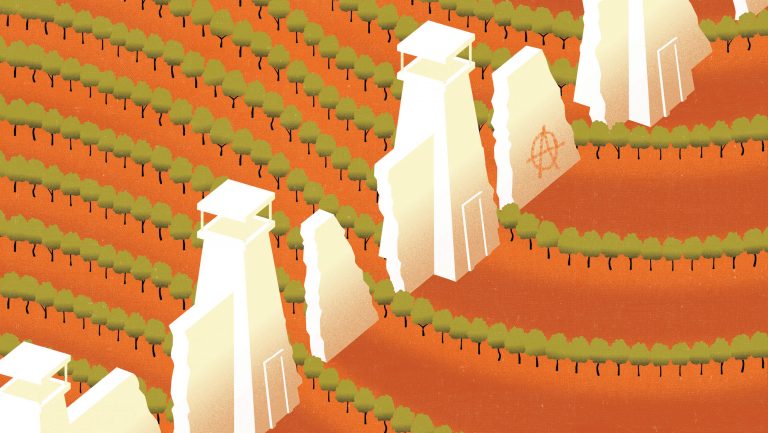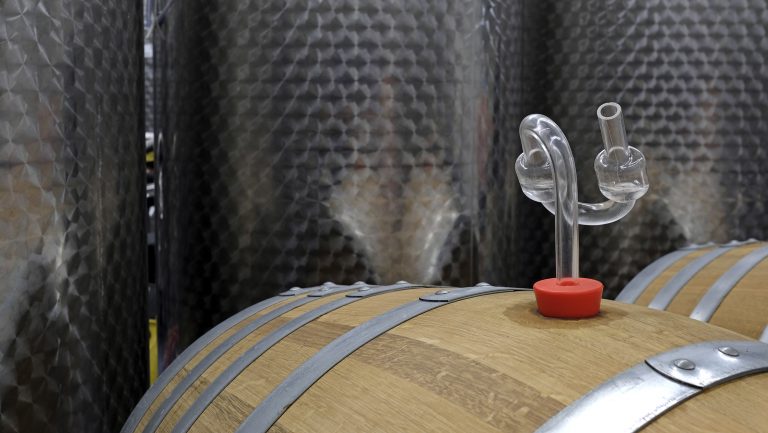“These grapes are not Israeli; they are not Palestinian. They belong to the region—this is something beautiful.”
I couldn’t believe what I had just heard from Ido Lewinsohn, who at the time was one of the lead winemakers for Recanati Winery in Israel (he has since become the head winemaker at Barkan Winery). That afternoon in July 2016, Lewinsohn was referring to wines that were being made in both Israel and Palestine from an ancient native grape variety—Marawi—that dates back thousands of years but hadn’t been bottled for sale in recent decades. He helped catalyze Israel’s first commercial release of Marawi in 2014. A collaboration between Recanati and a West Bank, Palestinian, grape grower, the wine showcased Marawi’s uniqueness, with flavors of green melon, wool, and apple, while being refreshingly low in alcohol, at 12% ABV. However, there was clearly a subtext. Only a couple of years after that inaugural vintage, Lewinsohn spoke of unity and togetherness, offering a notion of shared place over any kind of division. His words suggested an organic diplomacy where cross-border dialogue doesn’t usually occur.
In the face of such gravitas, under the Israeli sun, my role and how I viewed my profession began to shift. I now feel like a sommelier activist, leveraging wine’s privileged standing to improve people’s lives. With our wine purchases, I believe, we can help advance regional peace, provide support for farmers in war-torn regions, have a voice in geopolitics, and aid in economic recoveries. I shared this notion with Master Sommelier Pascaline Lepeltier, who said the idea has also been on her mind. As she moves on from her 10 years as the beverage director of Rouge Tomate in New York City—where she sought radical transparency in farming from the wines she chose for her list—Lepeltier will now explore new frontiers in the wine world. “I think today we can’t escape the fact that we are indeed working in an industry of hospitality, luxury, and leisure, but we are also working in the food and wine industry; thus we are between entertainment and agriculture.” As she evaluates new projects, Lepeltier finds she can’t ignore politics. “We can indeed make more politically driven choices,” she says. “Bringing political views seems to be tricky, yet it should be part of the game as it seems we are voting more and more with our dollars.”

Don’t miss the latest drinks industry news and insights. Sign up for our award-winning newsletters and get insider intel, resources, and trends delivered to your inbox every week.
Bottles Breaking Borders
As a prominent global product, wine is no stranger to geopolitical upheaval. Perhaps the best case study is Chateau Musar, from Lebanon’s Bekaa Valley, which was started by Gaston Hochar in the 1930s. Today, a global cadre of sommeliers and collectors adore this estate, but it wasn’t always that way. “Before the Civil War erupted in 1975, we sold 99 percent of our wine in Lebanon,” says Marc Hochar, Chateau Musar’s director of marketing and sales, who also sits on the board of his family’s estate. His late father, Serge, was responsible for pushing the winery to its legendary status, especially as he continued to make wine through years of political unrest. All the while, he was forced to look for new markets.
For Musar’s U.S. importer of nearly 20 years, Bartholomew Broadbent, there was never a question of whether to import this wine. His father, the famed British wine critic Michael Broadbent, declared Musar the Discovery of the Year after tasting the wine at the Bristol Wine Fair in 1979. “Of course, we all knew the history of the conflict in Lebanon, but I saw no risk in becoming their importer,” says Bartholomew. First, he declares Musar to be his favorite wine. But he also noticed that the wine continually rose above preconceived notions, while spotlighting a Lebanon that differed from the headlines in the nightly news. Marc Hochar even recalls a board meeting from his London banking life in the mid-’90s, not long after the Civil War ended, during which a client who was unaware of Hochar’s family ties, said, “I don’t know anything about Lebanon.” Unable to reference anything beyond the country’s instability, he continued, “Except for the great wines of Chateau Musar.”
For every Musar, however, there are hundreds of wineries and winemakers in struggling countries looking for ways to survive economic depressions, political upheavals, and other challenging circumstances. The wine director Nicole Hakli, formerly of Acme in New York City and now at Momofuku Ssäm Bar, found her calling with Turkish wines, breaking the mold to promote these generally unfamiliar wines on the lists she oversees. Her interest initially started as reconnaissance for her wedding. “My husband is Turkish, and since we were going to have a wedding in Turkey, I wanted to have local wines,” Hakli says. It proved a challenge to find a compelling sample set of Turkish wine imports. But by poking around on subsequent trips to Turkey, Hakli found a high-quality wine industry that enabled her to track down bottles back in New York City as well as some exclusively in Turkey. The discovery drew her in. “I had no idea how much I would love Turkey!” Hakli exclaims. “The love is a combination of the food, dining, culture, which is all very deserving of a fine-wine culture.”
Historians believe that the domesticated grape vine originated in Turkey’s Eastern Anatolia, so there is no question of the country’s ancient significance. A bevvy of grapes are endemic to Turkey, including Kalecik Karasi and Öküzgözü, which is a delightful find for intrepid sommeliers. Hakli sees great opportunity. “It’s amazing to go back every year and see how the wine is progressing,” she says. “This is why I’ve searched so hard for good Turkish wine.”
Hakli is keenly aware, however, that Turkey is a hot-button political topic. “I try to separate the two,” she says. The Turkish wine industry relies on its export market to exist and grow. “There are restrictions in their own country [on sharing] wine,” Hakli notes, and not just on exporting it but importing it as well, which is why in addition to promoting Turkish wine in the U.S., she regularly brings bottles back to Turkey from all over the world so that the winemakers can taste other regions and styles.
Thankfully, Hakli’s New York City clientele tend to revel in her discoveries and are intrigued when they taste the delicate red fruit of Kalecik Karasi instead of an everyday go-to like Pinot Noir. “Most people are happily surprised to see a Turkish wine,” she says. “Some reminisce about their vacations as a child watching balloons in Cappadocia.”
Yet when I push to find out whether she feels like an activist for Turkish wine, Hakli humbly answers, “I find value in playing a supporting role for Turkey,” adding that her quest to promote the country’s wines also gives her the opportunity to promote the national pride that the Turks have for their wine.
The Financial Vine
To reiterate Lepeltier’s point: Wine is also a business. Financial support of a country’s wines contributes to the well-being of regions, countries, and producers. While Greece, for one, continues to struggle with the fallout from its economic crisis of 2009, its wine industry is flourishing due to sommeliers recognizing the quality of Greece’s native grape wines and innovative winemakers. Bottles are now found on top wine lists across the country. Greek wine has also been supported—and promoted—in the United States by Sofia Perpera, a native Athenian and Bordeaux-trained enologist, and her husband, George Athanas. Around 15 years ago, the couple created the North American Campaign for Wines of Greece. Perpera, citing Eurostat statistics, explains that from 2011 to 2016, Greek wine’s export value to the U.S. increased by 72.1 percent, and its volume by 26.3 percent. On top of that, the average export price for the same period increased by 36.3 percent, to €4.88 per liter. And since its inauguration in 2003, Athanas says sommeliers have been the drivers of this upward trend. “For us,” he says, “there was no one better positioned to tell our story than somms, who are the gateway to consumers and have a ton of influence with their colleagues in the wine business.”
Commenting on their experience also running the Wines from Santorini campaign, Perpera says, “When we started our program eight years ago, the cost of Assyrtico grapes was 80 cents per kilo, while now it is around €3.5 per kilo and could hit €5 soon!” What’s clear is that the popularity amongst—and the buying power of—sommeliers has been influential.
The Republic of Georgia is one country that hopes to mimic the export success of Greece. An ancient Georgian wine culture remains under the radar of many professionals and consumers. What’s kept Georgia out of the spotlight? “The key thing here is that Georgia is a very poor, dominantly agricultural country that is struggling to rebuild itself after the Soviet economic catastrophe,” explains Lisa Granik, MW, an American who unofficially holds the title of Georgian Minister of Wine.
The Republic of Georgia has the perfect backstory to engage sommeliers: One of the oldest homes to Vitis vinifera is the Kakheti Valley, winemaking dates back to the Neolithic Period, native grape varieties abound, and a regionally distinctive method exists for making and aging wine in buried clay vessels called qvevri. But there is also a tension that has held them back. Granik’s assessment is that the Georgian winemaking community “largely wishes to orient itself toward the West rather than Russia and the East,” and she regularly leads trips and seminars through the Caucasus Mountains to broadcast this message.
“Whether visiting Georgia as a wine tourist or simply buying a bottle of wine, you are supporting all these sectors of an economy that is struggling to rebuild itself,” Granik says, emphasizing that the fiscal stability of a thriving wine industry can lead to geopolitical autonomy. And buying these wines can also be a selling point on the restaurant floor. “Each wine that you buy is not the same thing!” says Granik. “The sommelier can convey very quickly that Georgia is not simply a wine but a story and an opportunity for micro-activism.”
Activism. It’s the term I’ve been chasing, trying to understand wine on the fringes through its trusted agents. The search leads me to Jason Bajalia, a U.S.-based importer of Palestinian wines who is himself Palestinian American. Yes, his job is as tough as it sounds. He says, “The first thing people ask me is, ‘They make wine in Palestine?’” His star winery is Cremisan Wine Estate, which is associated with and has been managed by a Salesian Christian monastery for just over a century. It’s located on the road to Bethlehem in the Palestinian Christian town of Beit Jala in the West Bank. Bajalia is well aware of the complexities of his vision. “We’re not scared to verge on politics,” he says. “But listen—we don’t want a Palestinian pity party. We want the wine to stand on its own.”
Beyond Cremisan’s unique native grape varieties—Hamdani, Jandali, Dabouki, and Baladi—which border on the extraordinary, it’s Bajalia’s earnest demeanor that really fuels the spirit of this endeavor. “People don’t think of me when they think of a Palestinian person,” he explains, casting himself as a Christian-Palestinian-American. Like the nouveau Palestinian that he portrays, Bajalia also showcases a different side to a place that few people have access to—and most have seen only in a negative light in news reports. He relishes his role as an intermediary, using wine as the bridge.
Bajalia’s proudest moment thus far? “Zahav restaurant in Philadelphia—not just a Mediterranean restaurant, but Israeli—put our wines on their list in 2015,” he says. Beyond the addition, the restaurant made a significant edit: “They amended the list heading to now say, ‘Wines of Israel and Palestine.’ We’re in their family now.”
New Global Wine Route
“The way I see it, the sommelier’s role is to make sure that wine is more than something to drink,” says Marc Hochar. “Wine can be an experience, a communication, and a representation of a country.” Sure, supporting wines from lesser known and often troubled countries can be an uncharted course. It seems similar to the way Michael Broadbent must have felt when he first found Chateau Musar. But while there are inherent challenges, there is also exhilaration—and the potential for sommeliers to bring to light an estate or a wine industry worthy of global recognition. And along the way, somms should feel empowered to discuss all the elements that make purchasing one wine over another different. Says Lepeltier, “I believe there will be a higher chance of quality—in every acceptation of the term—with both ecological and social consideration.”
Wine transcends borders and bridges cultures, and it can be used to improve lives if we make the right purchases. The beautiful eulogy for Serge Hochar that was written in 2015 for the Jerusalem Post by the Israeli wine ambassador Adam Montefiore best exemplifies this idea. In his article, “A Cedar in Lebanon,” he said, “Why would an Israeli newspaper be interested in a Lebanese winemaker? The answer is because wine is above politics (something Serge used to say, and he would know).”

Dispatch
Sign up for our award-winning newsletter
Don’t miss the latest drinks industry news and insights—delivered to your inbox every week.
Peter Weltman is a sommelier and entrepreneur based in San Francisco who explores native grapes from ancient sources. He writes for global food publications, gives speeches on wine activism, and creates immersive experiences about his movement, Borderless Wine. Find out where he’s reporting from next on Instagram.







